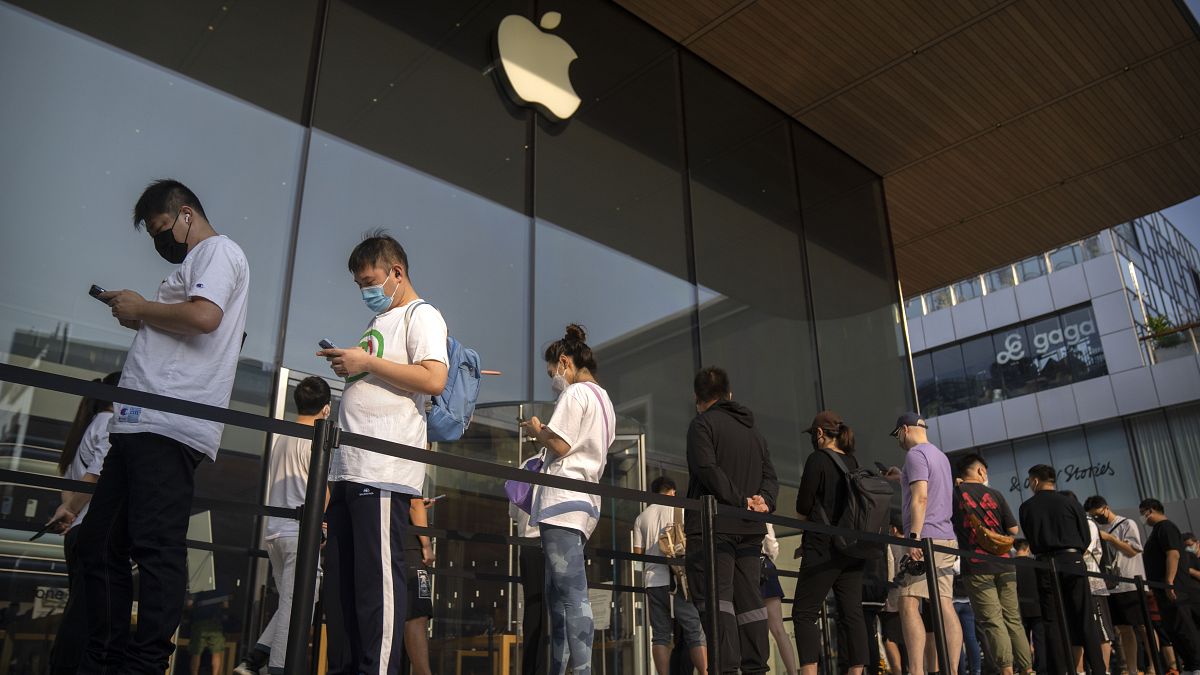Apple's shares have been tumbling for the second day in a row, losing the equivalent of Hungary's GDP, after news that the tech giant could face a partial iPhone ban in China.
China's widening curbs on iPhone use by government staff intensified a sell-off of tech stocks on Friday, fanning fears that Apple and its suppliers could take a hit from rising tensions between the US and China and growing competition from Huawei.
Apple shares tumbled 6.4% over the past two days, wiping $190 billion off its market capitalisation, which is the equivalent to Hungary's GDP (the tech giant is still worth $2.8 trillion, roughly equal to the economic output of France). The sell off was mainly fuelled by news that Beijing has told employees at some central government agencies in recent weeks to stop using iPhones at work.
China is Apple’s biggest foreign market and also the company's global production base.
Adding to the pressure on Apple, Huawei on Friday launched two new smartphones: foldable phone Mate X5 and Mate 60 Pro+ smartphone, a new addition to a series it unveiled last week that captured global attention for its success in beating back against US sanctions.
The series of unexpected new products launched by China's "national champion," just days before Apple is expected to unveil new iPhones, is raising concern about sales prospects in one of Apple's biggest markets.
"We believe that Huawei's activity this time was well-prepared and not sudden," said Ivan Lam, an analyst at Counterpoint. "Our current outlook for the new product release is better than our previous estimation."
What would it 'cost' for Apple to lose the goverment's sympathy?
It's currently unclear how widespread the curb on iPhone use is.
Previous reports from Bloomberg suggested that the restriction is going broad, encompassing state-owned enterprises and other government-controlled organisations.
At the same time, some staff told Reuters they have not received any such instructions.
Bank of America estimates that China accounts for up to 50 million in annual iPhone sales and such a ban could cost 5-10 million units a year.
It said the timing of the ban is "interesting" as "the recent launch and availability of a domestic high-end smartphone as a real alternative to an iPhone coincides with the timing of this potential ban."
Several Wall Street analysts said the curbs show that even a company with a good relationship with the Chinese government and a large presence in the world's second-biggest economy was not immune to rising tensions between the two nations.
In recent years, Washington has tried to restrict China's access to key technologies including cutting-edge chip technology, and Beijing looks to reduce its reliance on American tech.
Apple's suppliers also tumble
Suppliers across the tech sector were also hit hard by the news.
Apple's supplier Qualcomm, one of the US companies with the largest presence in China, tumbled 7.2% to lead losses among major tech firms on Thursday.
Other suppliers of the iPhone manufacturer, including Broadcom, Skyworks Solutions and Texas Instruments, were also lower, falling between 1.8% and 7.4%. Japanese chip equipment maker Tokyo Electron and camera lens-maker Largan Precision equally dropped 4% on Friday.
"This announcement seems to have just refocused investors that the relationship between the US and China is a big risk to current equity prices, particularly in technology," said Rick Meckler, partner at Cherry Lane Investments.



